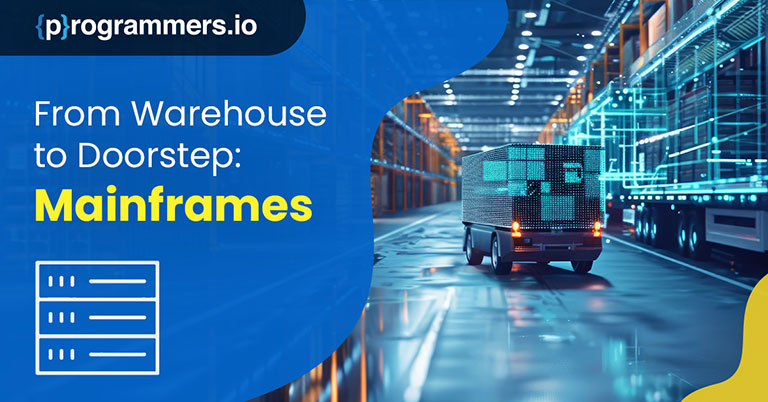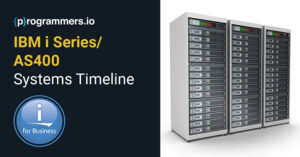Have You…,
Ever wondered what keeps global logistics running smoothly 24/7?
If not, then let’s…,
Step into the world of logistics and uncover the vital role IBM Z Mainframe plays in driving industry innovation and efficiency.
Introduction
The logistics industry, the lifeline of global trade and commerce, relies heavily on efficiency, reliability, and real-time data processing. At the heart of this intricate network of transportation, warehousing, and inventory management lies a powerful yet often overlooked technology: mainframes. Despite the rapid advancement of cloud computing and distributed systems, mainframes remain indispensable in logistics for several compelling reasons.
Roles and Responsibilities
- Mainframe technologies are known for their high data processing power, making them ideal for logistics applications.
- Streamlining logistics processes is facilitated by the mainframe, which processes large amounts of data with high security.
The Logistics abbreviation used in the blog
1. PO – Purchase Order:
The purchase order is a contract between the buyer and seller, and it contains information about the product or service to be delivered, the delivery date, and any other terms and conditions. The purchase order is also called a ‘PO’.
2. ASN – Advanced Shipping Notice:
The Advanced Shipping Notice (ASN) provides detailed information about a pending delivery. It is used in supply chain management to help streamline and improve the receiving process.
3. UPC – Universal Product Code:
Universal Product Codes, also called UPCs, are unique numerical codes associated with products. When scanned, the barcode reveals important information about the product such as brand name, size, price, and more.
4. SKU – Stock Keeping Unit:
SKU is a shorthand code that encapsulates crucial information about a product, such as its size, color, style, and manufacturer. The unique identifier facilitates accurate inventory management, minimizing errors and improving efficiency.
How IBM Z Mainframes play a vital role in streamlining the logistics processes
- In logistics (retail store Businesses like Walmart), everything starts from where the buyer of any store submits the Purchase Order – PO for their stores in the mainframe systems.
- The buyer mentions the product and quantity in the PO, and after the store supervisor approves the PO the PO data is sent to the mainframe system where all the information of that PO is stored in database tables on the mainframe, like DB2 systems.
- Then that approved PO gets to the vendor for the purchase and financial transactions and after that transportation of goods and services from the vendor to the warehouse of the company.
- During the transportation of goods and services, the mainframe plays an important role, since routes are planned and optimized by mainframe systems. Our goal during transportation is to find the most efficient routes so that we can meet factors such as fuel efficiency and on-time delivery
- Physically the order or the goods are transported from vendor to warehouse but the information regarding the goods should be available virtually in the system where mainframe JOBs play a very important role.
- Based on the information of Purchase Orders mainframe creates an ASN where we have the information after the goods are transported from a vendor where we can have the data regarding the vendors, financial details, and transportation information like Trailer or Truck numbers. So, all this information is generated by the mainframe jobs which process a high amount of data with security and accuracy.
- Based on the ASN data mainframe jobs create the information about the cartons and pallets, UPC numbers, styles, classes, and SKUs of the products.
- All that information generated by IBM Z Mainframe Jobs is stored in the DB2 databases.
- By using the IBM Z Mainframe Jobs, we create the data of the goods that are required for further development or further processing.
- As a result, cartons or goods are transported virtually and physically from the vendor to the warehouse of the company, and all data is handled by the mainframe.
- Once we get the cartons, pallets, or goods in the warehouse, by using mainframe screens and scanners warehouse personnel scan the inventory received in the warehouse.
- By using CICS screens warehouse personnel mark the entry of the cartons and trailers and do the inventory verification based on the Purchase Orders.
- Based on the store’s requirements mainframe JCL jobs do the allocation of the cartons and quantities to the stores, i.e. which store requires how much inventory.
- Then allocated cartons to the store will leave the warehouse for delivery at the stores. So now inventory is transferred from the warehouse to the stores.
- Using the CICS screen, stores accept cartons and inventory, which are then debited from the warehouse inventory database and added or transferred to the store’s inventory, making the products available at the store.
- Effective logistics stands on the pillars of accurate and timely inventory management. The mainframe supports the real-time tracing of inventory levels, ensuring that goods are stocked optimally and reducing the likelihood of stockouts or overstock situations.
- This level of precision contributes to streamlined supply chains and improved overall efficiency.
- So, by using JCL jobs, CICS screens, VSAM files, and Cobol Programs e. by using mainframe technologies, we can have a streamlined logistics process.
Data Security and Integrity in logistics
- In the logistics industry, we have very sensitive data of vendors, financial transactions of the company, details of customers, and banking and financial details of the customer like credit card, and debit card details so we should maintain the security and privacy of this sensitive information.
- One of a firm’s most valuable resources is its data: Customer lists, accounting data, employee information, and so on. This critical data needs to be securely managed and controlled, and, simultaneously, made available to those users authorized to see it. The mainframe computer has extensive capabilities to share simultaneously, but still protects the firm’s data among multiple users.
- In an era where data breaches and cyber threats are very serious issues, mainframes in logistics and transportation serve as guardians of data security.
- A robust encryption, access control, and secure authentication mechanism safeguard sensitive information about logistics, inventory management, as well as financial and banking information.
- Check out the following link for more information Mainframe
Real-world Applications
Some shipping companies had grown after implementing mainframes.
- Shipping companies faced challenges in optimizing their vast network of shipping routes. By implementing mainframe-based logistics optimization solutions, the companies achieved so much success.
- Mainframe-optimized shipping routes, reducing fuel consumption and transportation costs.
- Efficient route planning ensured timely deliveries, enhancing customer satisfaction and loyalty.
- Some trucking fleet companies changed their fortune by implementing mainframes.
- Trucking fleet companies grappled with unplanned vehicle downtime due to inefficient maintenance practices. Mainframe-driven fleet management solutions delivered good results.
- Proactive maintenance scheduling reduced unexpected breakdowns, lowering overall maintenance costs.
- Optimized maintenance contributed to a longer lifespan for the fleet’s vehicles.
Future Trends
1. AI-Powered Predictive Analytics:
- The integration of artificial intelligence into mainframes is poised to revolutionize logistics.
- AI-powered predictive analytics can anticipate issues, optimize routes dynamically, and enhance overall operational efficiency.
2. Blockchain for Supply Chain Transparency:
- Blockchain technology holds promise in providing transparency and traceability in the supply chain.
- Mainframes, when integrated with blockchain systems, can ensure the integrity of data related to shipments, deliveries, and inventory management.
Conclusion
The logistics industry relies heavily on mainframes to ensure efficient and effective inventory management in a fast-paced environment. They simplify logistics processes, boosting business operations. Data processing on mainframes is crucial to addressing privacy concerns, as well as to securing large volumes of data. Future logistics will be shaped by the integration of mainframes with emerging technology as technology develops and transportation systems become more complex. Their longstanding service and technological utility make mainframes legendary in the tech industry, continuously adapting to new changes, requirements, and innovations. This adaptability ensures they remain vital to major business industries, driving progress and efficiency.




